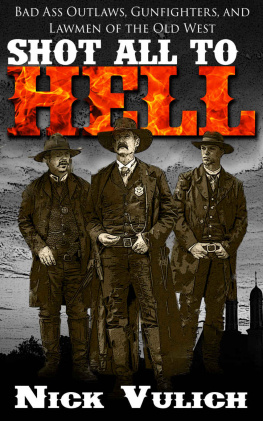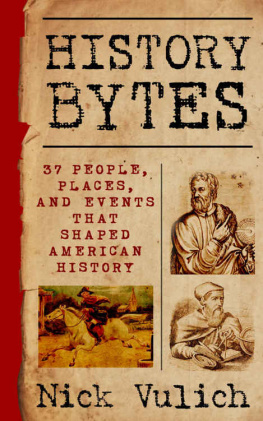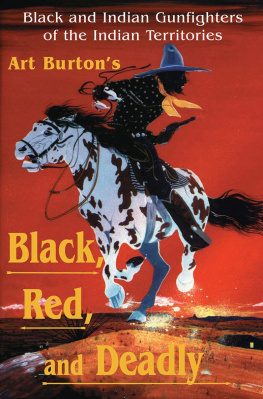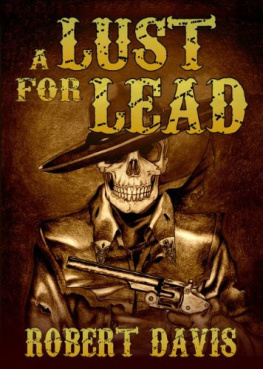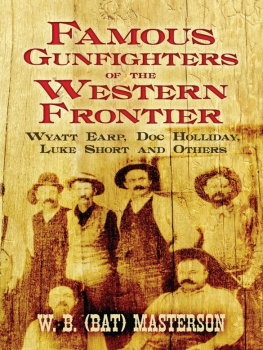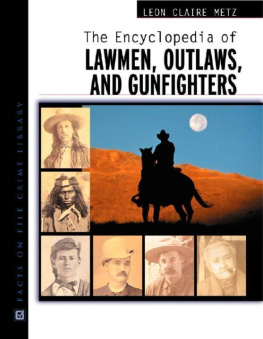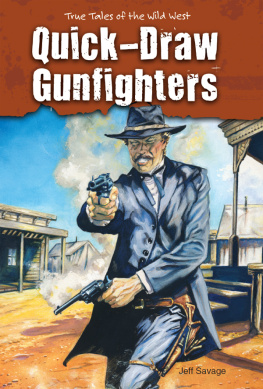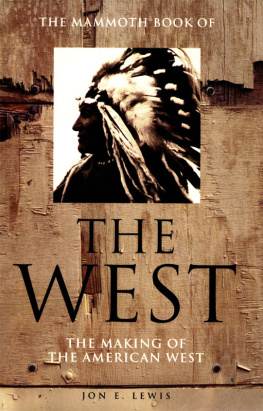Western Bad Men
For over 150 years the image of western bad men has thrilled readers and filled movie screens. Who hasnt heard of Jesse James, the Dalton Brothers, Black Bart, or Belle Starr? They are as much a part of American folklore as George Washington, Abraham Lincoln, and Theodore Roosevelt.
Theres something about the west that has brought out the best, and the worst in mankind. The funny thing is, a cult following has developed around many of these bandits, making them out to be something they never were.
The legend that grew up around Joaquin Murrieta was that he was just an average guy who moved from Mexico to California, and tried to strike it rich during the gold rush. What he discovered instead, was a big sign that read, No Mexicans Allowed. His supporters say, that because of the Foreign Claim Tax, he was forced off his land and into a life of outlawry. And, then to support that claim, a whole legend has been built up, about how he stole from the rich, and shared his wealth with poor Mexican families. The only problem is the facts dont support that interpretation. Murrieta, and his gang of outlaws, specialized in robbing poor Chinese immigrants. The only people they shared with were themselves.
The same stories developed around Jesse James. Legend has it, Jesse only stole from wealthy bankers and railroad men, and the reason he could disappear into thin air after pulling a bank job or train robbery was because he shared the booty with needy Missouri families. As with Murrieta that probably never happened. Jesse James was a thief. He stole money wherever he could get his hands on it. He robbed stagecoaches, banks, trains, and you-name-it. And, as far as just robbing the rich, not so. During most of their train and stage robberies the James-Younger Gang collected money and jewelry from passengers, as well as the booty from the express car.
Bob Ford is another interesting character. He was a gunfighter, a robber wannabe, who along with his brother, Charlie, got into Jesse Jamess good graces, then shot him in the back. Ironically, several years later he met the same fate in a Colorado dancehall.
My personal favorite is Black Bart, the gentlemen robber of the west. Bart only robbed Wells Fargo stagecoaches, and he always asked the drivers to Please throw down the box. Of course, he backed his request up with a double-barreled shotgun. Bart singlehandedly pulled twenty-eight stagecoach robberies over an eight-year period without ever firing a shot. When he was caught, he served his time, and disappeared entirely off the radar.
And, last, but not least, theres Belle Starr, one of the most badass female robbers on record. Belle called her pistols her babies, and ruled an outlaw kingdom based out of her home in Indian Territory. She lived by the gun, and she died by the gun.
As I look back on my childhood days reading through the books of Max Brand and Zane Grey, and paging through a bazillion and one western magazines Real West , True West, Frontier Times, Westerner , and more, and watching God knows how many westerns Gunsmoke , Bonanza , and the Wild, Wild West the outlaw life was almost always portrayed as a glamorous life, filled with loose women, blazing guns, and saddlebags overflowing with gold, silver, and greenbacks.
What a life!
The only thing is, all the movies, books, and TV shows painted a distorted portrait of life in the old west. James Dodsworth lived the outlaw life for six weeks while riding as a spy with the Doolin-Dalton Gang. He said the gang was always on the move. They rarely spent more than one night in any one place. Dalton and Doolin, both worried theyd end up like Jesse Jamesshot in the back.
At night, the gang always posted at least one man on watch duty. The rest of the band slept with Winchesters by their sides, and pistols under their heads. Every one of them was ready to spring into action at a moments notice.
And, as for those saddlebags overflowing with riches, more often than not, they were like a Charlie Brown Halloween specialfilled with rocks rather than gold.
Sometimes the gang would cut off the wrong car during a train robbery, and end up riding away empty handed. Sometimes a posse would chase them off a little too soon, before they could grab their booty. Other times, it was slim pickings, and there was nothing to take.
The first train job the Dalton Gang pulled went totally awry. The Expressman got away before they could convince him to open the safe, and in their haste to rob the Atlantic Express the boys forgot to bring dynamite to blow the safe. Black Jack Ketchum, and his gang, made off with $100,000 in unsigned bank notes. Pearl Harts fame rests upon a single stagecoach robbery that netted her under $500, and several years in the caboose after she was captured.
The sad truth is most outlaws led a short life that ended, either at the end of a rope, or with a bullet in the brain. Only a lucky few survived into the new centuryFrank James, Cole Younger, and Emmett Dalton, to name a few.
( Authors Note : Seven of these stories first appeared in my previous book, History Bytes: 37 People, Places, and Events That Shaped American History . Some have been rewritten for this publication, others shamelessly copied. The rest of the stories are new to this volume. My hope is you will enjoy reading them as much as I enjoyed writing them.)
Joaquin Murrieta California Bandit
Most of what we know about Joaquin Murrieta is pure horse-hockey. A California journalist, John Rollin Ridge (Yellow Bird), created the legend most people know as Joaquin Murrieta in his 1854 book, The Life and Adventures of Joaquin Murieta .
Ridges book makes it appear as if Murrieta was a modern day Robin Hood forced into outlawry by racist whites. It says, he turned to stealing horses, robbery, and murderrobbing the rich, and distributing his plunder among needy Mexican families.
The only problem is theres no evidence to support this. The Semi-Weekly Messenger wrote Murrieta was as merciless as a hyena. He tied men to trees and left them to perish in the unfrequented forests; he raided towns and spared neither age nor sex; he raided Chinese mining camps, and on one occasion cut the throats of eleven Chinamen in a camp near Sutlers Creek.
We know very little about Joaquin Murrieta other than he came to California, from old Sonora, Mexico, sometime in 1850, to try his luck in the goldfields. It is likely his wife, Rosa, several of her brothers, and his brother Carlos, came with him.
The clan staked a claim near Hangtown, and it is speculated they lost their property due to the Foreign Claim Tax (a penalty imposed on non-white miners to keep them out of California). Sometime in 1851, Joaquin Murrieta joined his brother-in-law, Claudio Felizs gang. That was his introduction to outlawry. No matter how you slice it these guys were no angels, they robbed and murdered lone travelers. Claudios band terrorized the minefields for two years until they were recognized as they tried to rob the John Kottinger Rancho near Pleasanton. Shortly after that they changed their MO and robbed a native Californian, rather than their usual prey of Chinese immigrants. The gang was tracked down, and Claudio was killed fighting off his pursuers.
Joaquin Murrieta assumed leadership of the band after the death of Claudio Feliz. Manuel Garcia, better known as Three Finger Jack, served as his headman. Together they began a six-month reign of terror in Calaveras County, starting in early 1853.
Governor John Bigler organized the California Rangers on May 11 th , 1853. They were an elite group, led by former Texas Ranger, Harry Love, and charged with taking down Murrietas band, known as The Five Joaquins . The group was made up of Joaquin Murrieta, Joaquin Botellier, Joaquin Carillo, Joaquin Ocomorenia, Joaquin Valenzuela, and Three Finger Jack.

